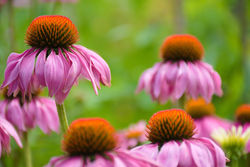Which flowers are used in skincare and cosmetics?
- Lars Wildes
- Feb 5, 2023
- 6 min read
What if I told you that a walk down the skincare aisle at your local pharmacy is pretty much the same as walking through a garden.
Confused? Here’s what I mean…
Flowers have been used for centuries as natural remedies for all sorts of ailments, from headaches and digestive issues to anxiety and fatigue.
And when it comes to skincare, flowers are not just added for color and fragrance but are also prized for their gentle yet powerful healing properties.
Yes, flowers make cute labels for your favorite skincare products, but they also contain vitamins and antioxidants that help to moisturize, cleanse, and smooth your skin, as well as fight early signs of aging and damage from free radicals.
Take roses as an example. We all know that they’re an iconic symbol of love and beauty. But did you also know that roses contain cell rejuvenating properties that minimize the appearance of scars, wrinkles, and stretch marks?
Want to know what flowers to look for when you’re shopping for skincare products and cosmetics? Check out the list of the top floral ingredients you'll find in beauty and skincare products — backed by scientific research — and get ready to experience the power of the garden on your skin.
Rose

Rose can be found in face mists, toners, face oils, serums, and moisturizers.
Roses are red, violets are blue… but they’re also super good for you. Rose petals contain antioxidants and anti-inflammatory compounds that soothe and hydrate sensitive skin.
A study published in the Journal of Clinical and Aesthetic Dermatology found that rose oil has a calming effect on the skin, making it an important ingredient in skincare products and cosmetics for sensitive skin.
Lavender

Lavender is used in face mists, toners, face oils, serums, and moisturizers.
Lavender is a favorite here in my garden and the bees love it. You’ll also find it in everything from air fresheners to candles.
Lavender is known for its calming scent and is used in a lot of skincare products because of its soothing properties. In a study published in the Journal of Medical Microbiology, researchers found that lavender has antiseptic properties and may be useful in treating skin infections.
Chamomile

Chamomile is incorporated into eye creams, face mists, toners, face oils, serums, and moisturizers.
Chamomile is a natural anti-inflammatory commonly used in skincare products to soothe and calm the skin. (And it makes a delicious tea.) In a study published in the Journal of Ethnopharmacology, researchers found that chamomile extract has a soothing effect on the skin and helps reduce redness and irritation.
Calendula

Calendula is a major ingredient in face mists, toners, face oils, serums, and moisturizers.
Calendula is known to have anti-inflammatory and soothing properties. In a study published in the Journal of Herbal Medicine, researchers found that calendula oil has a healing effect on the skin and can be used to treat a variety of skin conditions.
Jasmine

Jasmine can be found in face mists, toners, face oils, serums, and moisturizers.
Jasmine is a skincare product favorite because of its brightening and skin-toning effects. You’ll often see it in anti-aging products.
In a study published in the Journal of Ethnopharmacology, researchers found that jasmine extract has a moisturizing effect on the skin and may improve skin elasticity. Great for anyone looking for anti-aging products.
Marigold

Marigolds can be used in face creams, ointments, masks, face mists, toners, face oils, serums, and moisturizers.
In India, marigolds symbolize brightness and positive energy. In skin care and cosmetics, they pretty much do the same thanks to the anti-inflammatory and healing properties of the plant.
In a study published in the Journal of Ethnopharmacology, researchers found that marigold extract has a healing effect on the skin and can treat a variety of skin conditions.
Lotus

Lotus can be used in face creams, toners, and serums.
Lotus Flowers have also been used in medicine and skincare for hundreds of years and are still popular today. In skincare, the white-colored variety is preferred for its antioxidant-rich properties.
The lotus flower also has hydration and soothing properties. In a study published in the Journal of Ethnopharmacology, researchers found that lotus extract has a moisturizing effect on the skin and improves skin elasticity.
Elderflower

Elderflowers are added to toners, face masks, and serums.
Not only does elderflower make delicious tea, but it also has astringent properties and is used in skincare products to soothe and refresh the skin. In a study published in the Journal of Ethnopharmacology, researchers found that elderflower extract may help reduce redness and irritation.
Ylang-ylang

Ylang-ylang can be used in face oils, serums, moisturizers, face mists, toners, face oils, and serums.
In the 1920s, ylang-ylang used to create one of the world’s most iconic perfumes — Chanel No.5. Since then, hundreds of other perfumes have followed suit, making this flower one of the cosmetic industry’s best-loved flowers.
Ylang-ylang is known for its sweet scent and is often included in skincare products for its moisturizing properties. In a study published in the Journal of Ethnopharmacology, researchers found that ylang-ylang oil may help improve skin elasticity.
Gardenia

Gardenia is often found in face oils, serums, face mists, toners, face oils, serums, and moisturizers.
Gardenia is known for its brightening and skin-toning effects and is often used in skin care products because of this. The extract is rich in antioxidants and doubles the production of collagen, increasing the elasticity of the skin. It is used against inflamed skin and reduces wrinkles.
Sunflower

Sunflowers can be used in face oils, serums, face mists, toners, face oils, serums, and moisturizers.
From seeds to cooking oils, sunflowers are one of the most versatile flowers on the planet. They also contain antioxidants and are often used in skincare products for their skin-soothing properties. In a study published in the Journal of Clinical and Aesthetic Dermatology, researchers found that sunflower oil has a calming effect on the skin and may help reduce redness and irritation.
Orchids

Orchids are added to face creams, toners, face mists, toners, face creams, and serums.
Orchids are known for their moisturizing properties and are added to skincare products to hydrate the skin. The extract boosts the life of skin cells and enhances cell regeneration, strengthens cell membranes, and safeguards the skin’s immune system. Plus, the oil moisturizes the skin and reduces fine lines and signs of aging (Journal of Ethnopharmacology).
Neroli

Neroli is an important ingredient in many face oils, serums, face mists, toners, face oils, serums, and moisturizers.
Neroli is derived from the blossom of the Seville Orange Tree and is known for its calming, skin-toning effects and protection from free radicals. It’s hydrating, soothing and toning, and it lessens the appearance of fine lines and wrinkles (Journal of Ethnopharmacology).
Neroli also has antimicrobial and antibacterial qualities, making it great for skin care products that tackle breakouts and blemishes.
Helichrysum

Helichrysum can be used in face creams, ointments, and masks.
Helichrysum is known for its anti-inflammatory and skin-healing properties. In a study published in the Journal of Ethnopharmacology, researchers found that helichrysum extract has a soothing effect on the skin and may help reduce redness and irritation. Its common name is the 'Immortal Plant', so it's no surprise that it makes for great skincare products.
Daisy

Daisy is included in toners, face masks, and serums.
The ultimate symbol of summer here in Denmark, daisies are also often used in skincare products for their skin-soothing properties and for their ability to brighten skin and fight hyperpigmentation. In a study published in the Journal of Clinical and Aesthetic Dermatology, researchers found that daisy extract has a calming effect on the skin and may help reduce redness and irritation and heal wounds.
What is the most used plant in cosmetics?
We’ve all seen Aloe Vera (Aloe barbadensis) in everything from hand lotion to anti-aging face serums. This plant is known for its hydrating and soothing properties.

Aloe vera plant has numerous healing qualities and for this reason, it has a variety of uses in cosmetics as well. The leaves of the aloe vera plant contain a gel-like substance that has many minerals, vitamins, and amino acids.
And it’s a plant that’s very easy to grow yourself. Just make sure that you don’t overwater it. Let the soil dry out completely between waterings. Stick your finger into the soil to make sure it’s completely dry before watering your aloe vera again.
Besides the list above, there’s a whole bouquet of flowers and plants that are commonly used in skincare products.
Here are a few other examples:
Green Tea contains antioxidants that protect against environmental stressors and help to reduce inflammation
Tea Tree has antiseptic and anti-inflammatory properties that help to soothe and heal the skin
Lilac is used in face mists, toners, face oils, serums, and moisturizers.
Witch Hazel contains astringent properties that help to tone and tighten the skin and has been used to treat acne and other skin conditions
Geranium has a balancing effect on the skin, helping to regulate oil production and improve the overall appearance of the skin
Rosemary can be found in shampoos, conditioners, and hair masks.






Comments